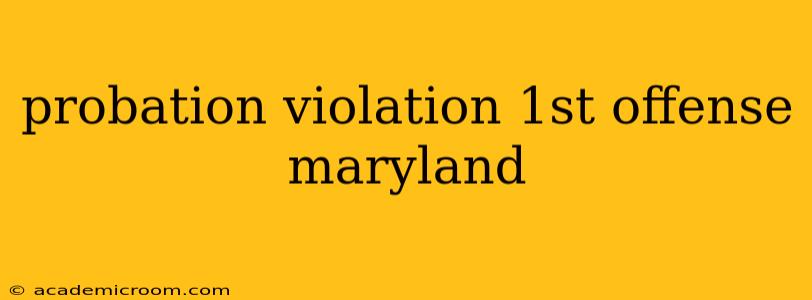Facing a probation violation in Maryland, especially for a first offense, can be incredibly stressful. Understanding the process, your rights, and potential consequences is crucial. This guide provides a comprehensive overview of probation violations in Maryland, focusing specifically on first-time offenders.
What Constitutes a Probation Violation in Maryland?
A probation violation occurs when you fail to comply with the conditions of your probation. These conditions are outlined in your probation order and can include:
- Regular reporting: Failing to report to your probation officer as scheduled.
- Drug or alcohol testing: Testing positive for prohibited substances.
- Curfew violations: Violating the mandated curfew times.
- Contact with prohibited individuals: Contacting people specifically forbidden by your probation order.
- Employment or education requirements: Failing to maintain employment or attend school as required.
- Residency restrictions: Moving without permission or residing in a prohibited area.
- Committing new crimes: Arrests or convictions for new offenses.
H2: What Happens During a Probation Violation Hearing?
If your probation officer suspects a violation, they will initiate a hearing. This hearing is a crucial step where you have the right to legal representation and present your case. The hearing process involves:
- Notification: You will receive official notification of the hearing, detailing the alleged violations.
- Presentation of Evidence: The probation officer will present evidence supporting the alleged violation. This could include police reports, witness testimony, or test results.
- Your Defense: You have the right to present your defense, including offering evidence to refute the allegations or explain any mitigating circumstances.
- Judge's Decision: The judge will review the evidence and make a decision. This decision could range from a warning to a revocation of probation and incarceration.
H2: What are the Penalties for a First Probation Violation in Maryland?
The penalties for a first probation violation vary depending on several factors, including the severity of the original offense, the nature of the violation, and your history. Possible consequences include:
- Warning: A verbal or written warning, with increased monitoring or stricter probation conditions.
- Increased Supervision: More frequent check-ins with your probation officer, increased drug testing, or other intensified monitoring measures.
- Community Service: Additional community service hours.
- Fines: Monetary fines for violating probation conditions.
- Jail Time: While less likely for a first offense, jail time is a possibility, especially for serious violations. The length of incarceration would depend on the circumstances.
H2: Can I Avoid Jail Time for a First Probation Violation in Maryland?
Avoiding jail time for a first probation violation is possible, but it depends on the circumstances. Showing remorse, cooperating with your probation officer, and demonstrating a willingness to comply with stricter conditions are key factors. Having a strong legal defense and presenting mitigating circumstances during the hearing can also significantly influence the outcome. You should always seek legal counsel to help build the strongest possible defense.
H2: What should I do if I'm facing a probation violation in Maryland?
If you're facing a probation violation, immediately contact an experienced Maryland criminal defense attorney. They can advise you on your rights, help you gather evidence, and represent you in court. Delaying legal action can significantly harm your case. Don't attempt to handle this alone.
H2: How long does a probation violation hearing take?
The length of a probation violation hearing can vary significantly, ranging from a brief proceeding to a more extensive hearing depending on the complexity of the case and the evidence presented.
H2: What is the difference between a technical violation and a substantive violation?
A technical violation involves a breach of probation conditions that doesn't involve a new crime (e.g., missing a curfew or failing a drug test). A substantive violation involves committing a new crime while on probation. Substantive violations generally carry more severe consequences.
Disclaimer: This information is for educational purposes only and does not constitute legal advice. Always consult with a qualified Maryland attorney for advice specific to your situation. The laws and procedures surrounding probation violations are complex and can change. This information should not be considered a substitute for professional legal counsel.
